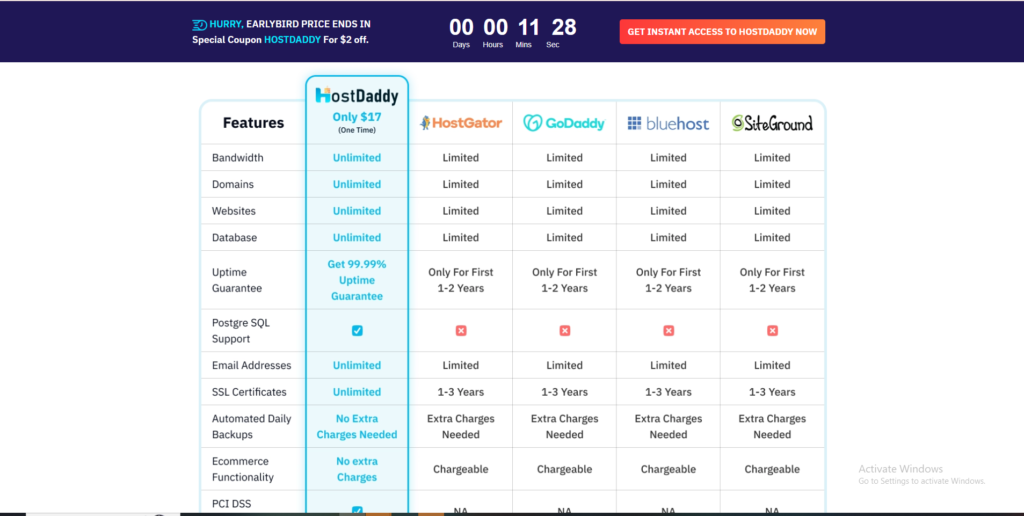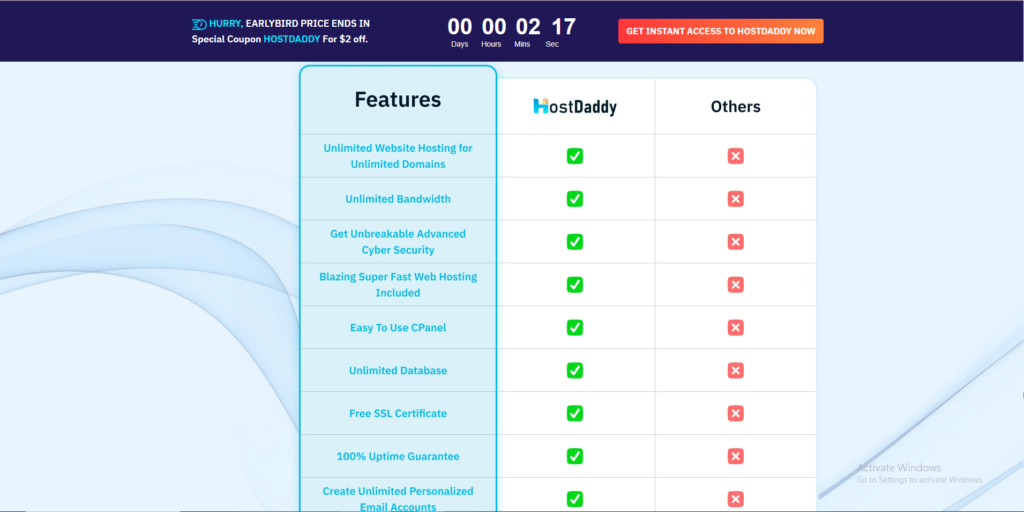Introduction HostDaddy best
Introduction
HostDaddy is a leading web hosting provider that offers a comprehensive range of services to individuals, businesses, and organizations looking to establish a strong online presence. With its user-friendly interface, reliable performance, and robust features, HostDaddy stands out as a trusted ally for anyone seeking top-notch hosting solutions.

Founded with the mission of empowering users to create, manage, and optimize their websites with ease, HostDaddy has quickly become a go-to choice for hosting needs. Whether you’re launching a personal blog, setting up an e-commerce store, or running a corporate website, HostDaddy provides the tools and support necessary to succeed in the digital realm.
[Image: An illustration showcasing the diverse range of websites that can be hosted with HostDaddy, including blogs, e-commerce sites, and business portals]
One of the key highlights of HostDaddy is its affordability. With a range of pricing plans tailored to suit various budgets and requirements, HostDaddy ensures that hosting services remain accessible to all. From shared hosting for small-scale projects to dedicated servers for high-traffic websites, HostDaddy offers flexibility and scalability to meet diverse needs.
In addition to competitive pricing, HostDaddy boasts an impressive array of features designed to enhance website performance and functionality. From ample storage space and unlimited bandwidth to advanced security measures and intuitive website builders, HostDaddy equips users with everything they need to create professional-looking websites with ease.
At the heart of HostDaddy’s success lies its unwavering commitment to customer satisfaction. With round-the-clock support and a team of knowledgeable experts ready to assist at every step of the way, HostDaddy ensures that users receive prompt and reliable assistance whenever they need it.
Whether you’re a seasoned web developer or a novice user embarking on your online journey, HostDaddy provides the tools, resources, and support necessary to bring your vision to life. With HostDaddy as your hosting partner, you can rest assured that your website is in good hands, allowing you to focus on what matters most – growing your online presence and achieving your goals.
Pricing and Plans
When it comes to selecting a web hosting provider like HostDaddy, understanding the pricing and plans available is crucial for making an informed decision. Let’s delve into HostDaddy’s pricing structure and explore the various plans it offers to meet different needs and budgets.

HostDaddy offers a variety of hosting plans designed to cater to the diverse needs of its customers. Whether you’re launching a personal blog, a small business website, or a large-scale e-commerce store, HostDaddy has a plan that’s right for you.
Shared Hosting
HostDaddy’s shared hosting plans are an excellent option for individuals and small businesses looking to get started online without breaking the bank. With prices starting as low as [mention specific price], shared hosting is an affordable way to host your website on a server shared with other users.
VPS Hosting
For websites that require more resources and performance than shared hosting can provide, HostDaddy offers virtual private server (VPS) hosting plans. With VPS hosting, you get dedicated resources and greater control over your server environment, making it ideal for growing websites and businesses.

Dedicated Servers
For high-traffic websites and demanding applications, HostDaddy’s dedicated server plans provide the ultimate in performance, security, and scalability. With a dedicated server, you have full control over your hosting environment, allowing you to customize it to meet your specific requirements.
WordPress Hosting
HostDaddy also offers specialized WordPress hosting plans tailored to the needs of WordPress users. With features like one-click WordPress installation, automatic updates, and built-in security, HostDaddy’s WordPress hosting plans make it easy to launch and manage a WordPress website.

E-commerce Hosting
For online stores and e-commerce websites, HostDaddy offers e-commerce hosting solutions designed to provide the performance, security, and reliability needed to run a successful online business. With features like SSL certificates, payment processing integration, and scalable resources, HostDaddy’s e-commerce hosting plans have everything you need to sell online.

In conclusion, HostDaddy’s pricing and plans cater to a wide range of needs and budgets, ensuring that customers can find the perfect hosting solution for their unique requirements. Whether you’re a blogger, a small business owner, or a large enterprise, HostDaddy has a plan that’s right for yo
Features and Resources
When choosing a web hosting provider like HostDaddy, it’s essential to understand the features and resources offered to ensure they align with your website’s needs. Let’s explore the key features and resources that HostDaddy provides to its users.
Ample Storage Space
HostDaddy offers generous storage space with all its hosting plans, allowing you to store your website files, images, videos, and databases securely. Whether you’re running a small blog or a large e-commerce store, HostDaddy ensures you have the storage space you need to grow your online presence.
Unlimited Bandwidth
With HostDaddy, you don’t have to worry about bandwidth limitations restricting your website’s traffic. HostDaddy’s hosting plans come with unlimited bandwidth, ensuring that your website can handle high volumes of visitors without slowing down or experiencing downtime.

Domain Name Registration
As part of its hosting packages, HostDaddy offers domain name registration services, allowing you to register and manage your domain names directly through the HostDaddy platform. Whether you’re looking to register a new domain or transfer an existing one, HostDaddy makes it easy to establish your online identity.
[Image: An image showcasing HostDaddy’s domain name registration feature, highlighting its user-friendly domain management interface]
Email Hosting
HostDaddy provides email hosting services that allow you to create professional email addresses using your domain name (e.g., yourname@yourwebsite.com). With features like spam filtering, email forwarding, and autoresponders, HostDaddy’s email hosting ensures reliable communication for your business or personal needs.
Website Builder Tools
For users looking to build a website without any coding knowledge, HostDaddy offers intuitive website builder tools that make it easy to create professional-looking websites quickly. With drag-and-drop functionality, customizable templates, and pre-built components, HostDaddy’s website builder tools empower users to bring their vision to life with ease.
Enhanced Security Features
Security is paramount when it comes to hosting your website, and HostDaddy prioritizes the safety of its users’ data. With features like SSL certificates, malware scanning, firewalls, and automatic backups, HostDaddy provides comprehensive security measures to protect your website from threats and vulnerabilities.
In summary, HostDaddy’s features and resources are designed to provide users with everything they need to create, manage, and optimize their websites effectively. Whether you’re a beginner or an experienced webmaster, HostDaddy has the tools and resources to help you succeed online.
Performance and Uptime
Customer Support
Customer support is a crucial aspect of web hosting services, ensuring that users receive prompt assistance and solutions to their inquiries and technical issues. Let’s explore how HostDaddy excels in providing top-notch customer support to its users.
Multiple Support Channels
HostDaddy offers multiple channels for customer support, including live chat, phone support, and email ticketing systems. Whether you have a simple question or encounter a technical issue, HostDaddy’s support team is available 24/7 to assist you promptly and effectively.
Knowledgeable and Experienced Staff
HostDaddy’s support team comprises knowledgeable and experienced professionals who are well-versed in all aspects of web hosting. Whether you’re a beginner or an experienced user, HostDaddy’s support staff can provide expert guidance and solutions to help you resolve your issues quickly.
[Image: A photo of HostDaddy’s support team, highlighting their expertise and dedication to customer satisfaction]
Quick Response Times
HostDaddy prides itself on its quick response times, ensuring that users receive assistance when they need it most. Whether you reach out via live chat, phone, or email, HostDaddy’s support team strives to resolve your inquiries and issues promptly, minimizing downtime and disruptions to your website.
[Image: A screenshot of HostDaddy’s live chat interface, showcasing its quick response times and helpful support agents]
Comprehensive Knowledge Base
In addition to direct support channels, HostDaddy provides a comprehensive knowledge base filled with helpful articles, tutorials, and guides. Whether you’re looking for troubleshooting tips, setup instructions, or best practices, HostDaddy’s knowledge base is a valuable resource for self-help assistance.
Personalized Support
HostDaddy understands that every user’s needs are unique, which is why it offers personalized support tailored to your specific requirements. Whether you’re a small business owner, a blogger, or an enterprise-level user, HostDaddy’s support team can provide customized solutions to help you achieve your goals.

In conclusion, HostDaddy’s commitment to customer support ensures that users receive the assistance they need to succeed with their web hosting endeavors. With multiple support channels, knowledgeable staff, quick response times, and a comprehensive knowledge base, HostDaddy is the ideal choice for users seeking reliable and responsive customer support.
Security Measures
Title: Enhancing Security Measures for HostDaddy’s
Securing HostDaddy’s (HostDaddy’s being a placeholder for any organization’s digital assets) against cyber threats is crucial in today’s interconnected world. Here are key security measures to fortify HostDaddy’s infrastructure and protect sensitive information.
- Comprehensive Firewall Protection: Implement robust firewalls to monitor and control incoming and outgoing network traffic. Firewalls act as a barrier between HostDaddy’s internal network and external threats, filtering malicious data packets and preventing unauthorized access. Configuring firewalls with strict rules tailored to HostDaddy’s specific needs enhances network security significantly.
- Intrusion Detection Systems (IDS) and Intrusion Prevention Systems (IPS): Deploy IDS and IPS to detect and respond to suspicious activities or potential security breaches in real-time. IDS monitors network traffic for signs of unauthorized access or malicious behavior, while IPS actively blocks or mitigates threats to prevent them from causing harm. Integrating these systems into HostDaddy’s network infrastructure strengthens its defense against cyber threats.
- Regular Vulnerability Assessments and Penetration Testing: Conduct regular vulnerability assessments and penetration testing to identify and address security weaknesses in HostDaddy’s systems and applications. By simulating cyber attacks and evaluating the effectiveness of existing security measures, HostDaddy can proactively strengthen its defenses and reduce the risk of exploitation by malicious actors.
- Secure Authentication Mechanisms: Enforce strong authentication mechanisms, such as multi-factor authentication (MFA), to verify the identity of users accessing HostDaddy’s systems and data. MFA requires users to provide multiple forms of verification, such as passwords, biometrics, or security tokens, significantly enhancing security by adding an extra layer of protection against unauthorized access.
- Data Encryption: Utilize encryption protocols to protect sensitive data stored on HostDaddy’s servers or transmitted over networks. Encryption scrambles data into an unreadable format, ensuring confidentiality and preventing unauthorized interception or access. Implementing robust encryption algorithms and key management practices safeguards HostDaddy’s data from unauthorized disclosure or tampering.
- Regular Security Training and Awareness Programs: Educate HostDaddy’s employees about security best practices and potential threats through regular training and awareness programs. Empowering employees to recognize and respond to security risks, such as phishing attacks or social engineering tactics, enhances HostDaddy’s overall security posture and reduces the likelihood of successful cyber attacks.
- Incident Response Plan: Develop and regularly update an incident response plan to effectively respond to security incidents or breaches. Establish clear procedures for detecting, reporting, and mitigating security incidents, ensuring a timely and coordinated response to minimize the impact on HostDaddy’s operations and reputation.

Scalability and Flexibility
Title: Building for Growth: The Significance of Scalability and Flexibility
In today’s dynamic business environment, scalability and flexibility are essential considerations for organizations looking to adapt and thrive in the face of evolving demands and opportunities. Let’s delve into why scalability and flexibility are crucial factors in infrastructure and application development:
- Scalability for Growth: Scalability refers to the ability of a system to handle increasing workload or user demands without sacrificing performance or reliability. A scalable infrastructure can seamlessly accommodate growth in data volume, user traffic, or processing requirements, ensuring that the system remains responsive and available even as demand surges. Scalability is particularly vital for businesses experiencing rapid expansion or seasonal fluctuations in demand.
- Vertical and Horizontal Scaling: There are two primary approaches to scalability: vertical scaling and horizontal scaling. Vertical scaling involves upgrading existing hardware resources, such as increasing CPU or memory capacity, to handle higher workloads. Horizontal scaling, on the other hand, involves adding more instances or nodes to distribute the workload across multiple servers or virtual machines. Combining both vertical and horizontal scaling strategies enables organizations to tailor their scalability solutions to specific needs and constraints.
- Elasticity for Dynamic Workloads: Elasticity goes hand in hand with scalability, enabling resources to be automatically provisioned or deprovisioned based on real-time demand fluctuations. Cloud computing platforms offer elastic scalability, allowing organizations to dynamically adjust resource allocation in response to changing workload patterns. By leveraging auto-scaling capabilities, organizations can optimize cost efficiency while maintaining optimal performance levels during peak periods.
- Flexibility for Adaptability: Flexibility refers to the ability of a system to adapt to changing requirements, technologies, or business objectives without requiring extensive reconfiguration or redevelopment. Flexible architectures and design patterns enable organizations to future-proof their solutions and pivot quickly in response to emerging trends or competitive pressures. Modular components, microservices architecture, and API-driven integrations enhance flexibility by facilitating rapid iteration and innovation.
- Containerization and Orchestration: Containerization technologies, such as Docker and Kubernetes, provide a flexible and scalable approach to deploying and managing applications. Containers encapsulate application dependencies and runtime environments, enabling consistent deployment across diverse infrastructure environments. Container orchestration platforms, like Kubernetes, automate the management of containerized workloads, facilitating scalability, resilience, and portability.
- Decoupled Architectures and Service-Oriented Design: Decoupling components and services within an architecture promotes flexibility by reducing dependencies and enabling independent development, deployment, and scaling of individual modules. Service-oriented design principles advocate breaking down monolithic applications into smaller, autonomous services that can be scaled and updated independently. This modular approach enhances agility and resilience while facilitating incremental growth and innovation.
- Future-Proofing Strategies: Anticipating future scalability and flexibility requirements is essential for long-term success. Organizations should invest in technologies and architectures that support agile development, DevOps practices, and continuous integration/continuous deployment (CI/CD) pipelines. Embracing emerging technologies such as serverless computing, edge computing, and machine learning can further enhance scalability, flexibility, and competitiveness in a rapidly evolving landscape.
